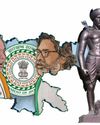The Asia Pacific’s future hinges on nuanced Chinese strategy and the unknown factors of a Trump presidency.

DECEMBER 7, 2016, saw the 75th anniversary of the Japanese attack on Pearl Harbor (December 8 in East Asia, thanks to the international dateline). The occasion was marked by visits of veterans to the site in Hawaii where World War II in Asia exploded into open conflict between the United States and the Empire of Japan. The sombreness of the occasion was made deeper by the knowledge that this was almost certainly the last commemoration that would be marked by the presence of living figures who remembered the days of the Pacific War. Yet, while distance has robbed us of most of the eyewitness accounts of that war, it has also enabled historians to come to some broader conclusions about its wider causes and meaning. One particular factor has come to the forefront of blame in recent years: the idea that mutual mistrust and misunderstandings helped drive two of the world’s great powers into open conflict in 1941. Make no mistake, the Japanese invasion of China in 1937 and Tokyo’s increasing desire to close off trade in Asia to any actors other than Japan were the key factors in forcing confrontation. However, examination of the diplomatic cables that show American and Japanese assessments of each other show that neither side really understood the other’s concerns on issues varying from maritime defence to free trade in the region. Eventually, those misunderstandings helped provoke a brutal war.
Diese Geschichte stammt aus der January 16, 2017-Ausgabe von Outlook.
Starten Sie Ihre 7-tägige kostenlose Testversion von Magzter GOLD, um auf Tausende kuratierte Premium-Storys sowie über 8.000 Zeitschriften und Zeitungen zuzugreifen.
Bereits Abonnent ? Anmelden
Diese Geschichte stammt aus der January 16, 2017-Ausgabe von Outlook.
Starten Sie Ihre 7-tägige kostenlose Testversion von Magzter GOLD, um auf Tausende kuratierte Premium-Storys sowie über 8.000 Zeitschriften und Zeitungen zuzugreifen.
Bereits Abonnent? Anmelden

Trump's White House 'Waapsi'
Donald Trump's victory in the US presidential election may very well mean an end to democracy in the near future

IMT Ghaziabad hosted its Annual Convocation Ceremony for the Class of 2024
Shri Suresh Narayanan, Chairman Managing Director of Nestlé India Limited, congratulated and motivated graduates at IMT Ghaziabad's Convocation 2024

Identity and 'Infiltrators'
The Jharkhand Assembly election has emerged as a high-stakes political contest, with the battle for power intensifying between key players in the state.

Beyond Deadlines
Bibek Debroy could engage with even those who were not aligned with his politics or economics

Portraying Absence
Exhibits at a group art show in Kolkata examine existence in the absence

Of Rivers, Jungles and Mountains
In Adivasi poetry, everything breathes, everything is alive and nothing is inferior to humans

Hemant Versus Himanta
Himanta Biswa Sarma brings his hate bandwagon to Jharkhand to rattle Hemant Soren’s tribal identity politics

A Smouldering Wasteland
As Jharkhand goes to the polls, people living in and around Jharia coalfield have just one request for the administration—a life free from smoke, fear and danger for their children

Search for a Narrative
By demanding a separate Sarna Code for the tribals, Hemant Soren has offered the larger issue of tribal identity before the voters

The Historic Bonhomie
While the BJP Is trying to invoke the trope of Bangladeshi infiltrators”, the ground reality paints a different picture pertaining to the historical significance of Muslim-Adivasi camaraderie